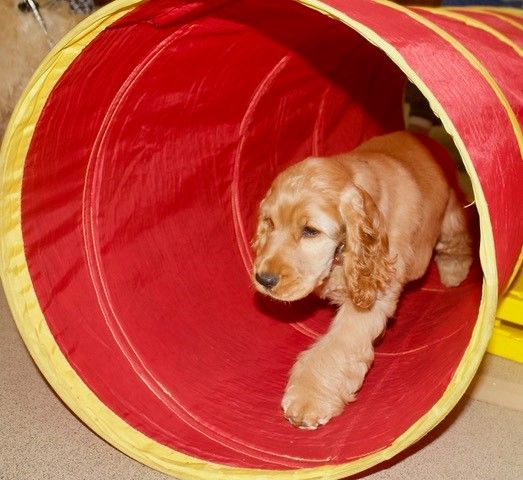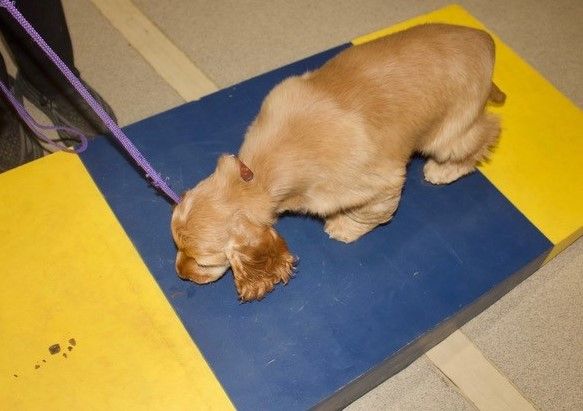PUPPY SOCIALISATION

Louis and Remy on their first outing
Socialising a puppy is vital for their development. If not done correctly, it can lead to behavioural problems.
As new members of the world, there are a lot of lessons that puppies need to learn. Feeling confident and comfortable with a wide range of people, pets and places is at the top of the list, and this all falls under the term ‘socialisation’. Here are some tips for socialising your puppy.
Where To Start
Socialisation starts from the moment you first pick your puppy up. Each new experience will help your puppy understand what to make of the world around them. Encountering every new smell, sound and sight in a positive way will build their confidence and let them grow into well-adapted dogs.
It’s very important that you don’t allow your puppy to interact with other dogs before they have completed their vaccinations, but puppies who are 8-16 weeks old are in the key stage for developing their socialisation skills. A great solution is to enrol your puppy in puppy school which provides a safe environment for your puppy to encounter other humans and puppies and also learn some basic cues.
Before it is safe to take your dog outside, you can still encourage the socialisation process at home. In this period, you can introduce your puppy to things such as appliances (especially the noisy vacuum cleaner), new materials under their paws and different scents.
How To Socialise A Puppy
Once their vaccinations are up-to-date, socialisation should be your key focus. It’s very important that your puppy interacts with lots of new people and animals, as well as takes part in varied experiences in their early stages so they can work out the right way to behave.
If your puppy isn’t correctly socialised, they can develop phobias and behavioural problems that can be very hard to fix down the track. You should encourage their curiosity and respond positively when they tackle a new experience. If your puppy responds with fear to a new person or animal, it’s important that you don’t make a big deal of it or remove them from the situation briskly. This will only reinforce negativity and lay the foundations for a fearful response in future. If you see your puppy relax and respond warmly to a new experience, reward them with praise.
Puppy Socialisation Checklist
Your puppy should learn how to interact with lots of different people and pets in normal day-to-day scenarios. You should introduce your puppy to:
People & Animals
- children of all ages
- adults, both men and women
- people of different ethnicities
- people with hats, glasses, facial hair, etc.
- people with crutches, wheelchairs, canes, etc.
- people on motorbikes, bicycles, scooters, skateboards etc.
- dogs and other puppies
- other pets, including cats, guinea pigs and rabbits
- wild animals in your area
Places
- sidewalks
- parks and beaches
- veterinary clinics
- pet stores
- other people’s homes
- car parks
- lifts
- construction sites
- ponds and rivers
- different surfaces – grass, slippery floors, stairs, wobbly surfaces, mud, sand, carpet, etc.
.jpg)
Charlie visiting Bunnings
Experiences
- riding in your car
- grooming
- bath time
- leash training
- crate training
- loud noises – vacuums, fireworks, traffic, hair dryer, microwave, music, large crowds, etc.
- having various parts of their body handled and inspected – teeth, mouth, paws, etc.
- rain and thunderstorms
- swimming
- wearing clothing
Puppy School

Lulu gratuating from Puppy School
Given the importance of socialisation and early training in puppies during the crucial imprinting stage between 8 and 18 weeks of age, this is a time when puppies are most open to learning and accepting new situations and experiences.
Puppy schools are directed to puppies of this age to expose them to a variety of people (males, females, tall, short, lanky, round, glasses, beards etc) and a variety of dogs (large, small, fluffy, smooth, timid and boisterous) to learn how to interact appropriately with them in a safe and controlled environment.
This is the first step in developing a well balanced adult dog who is confident and friendly to people and other dogs, and can help to prevent later fear and aggressive responses. It is important to continue socialising your dog to as many sights, sounds, and smells as possible throughout adolescence, but this early imprinting period is seen as perhaps the most important. This makes attending a professional puppy school absolutely crucial, regardless of your training expertise or having other dogs at home.
What Is Puppy Pre-School?
Puppy pre-school is different to obedience classes. Obedience classes are designed and focused for ongoing training of obedience commands in a group setting for dogs over 6 months of age, whereas puppy school is about getting the foundations right for your puppy’s future life.
Puppy school focuses on early socialisation in that crucial imprinting stage, providing valuable and timely information to puppy guardians, and helping to rectify any identified or potential issues in your dog’s developmental stage before they become ingrained and difficult to rectify.
There is a misconception among many puppy owners that their dog is not fully vaccinated and therefore can’t attend puppy school. However, a reputable puppy school will be conducted in a clean, safe and controlled environment such as within a veterinary surgery, which minimises any risk to your puppy’s health.
Puppy Pre-School Is For Puppies
By interacting with other puppies at a young age, your puppy will be able to experiment with different types of play. Learning to read and communicate with other dogs using this doggy language will help your dog to play and interact successfully with other dogs into adolescence and adulthood.
Good puppy schools will be closely supervised by a professional trainer with expertise in early canine behaviour who will focus on encouraging and rewarding the right behaviours with praise, treats or games. They can identify appropriate play versus bullying or intimidation and ensure that these early experiences are positive for all of the puppies involved. Unfortunately, an instructor without this knowledge and experience can possibly do more harm than good.


Remy participating in simple fun activities using postive reinforcement and treats at Puppy School
Your Puppy Will Learn To Control Their Biting
Puppies bite. This is normal and it is important for puppies to experiment with biting so that they can learn not to bite too hard and then not to bite at all. They need to learn how to control their jaws and develop what is known as ‘bite inhibition’ so that if they are in a stressful situation and they do react with a bite, they will be able to control the bite and use a soft mouth. Other puppies are the best teachers, in a supervised puppy school environment. If a puppy bites too hard in play, the other pup will yelp and end the game for a while.
Your Puppy Will Learn How To Settle
There are many approaches to teaching puppies to settle, from crate training to mat training to simply teaching them a cue to indicate that play time is over. Puppy school will usually have some time for the puppies to play and some time for the guardians to learn. During this time, the puppies can be held or encouraged to lie down and disengage from playing with the other puppies. This will become a valuable skill for times when you don’t wish the puppy to be underfoot or attention seeking.
Your Puppy Will Get Used To Being Held
From a young age, puppies should experience being handled by other people, including their ears and paws, in combination with treats and positive talk. By exposing your puppy to this as a positive experience, you are helping to set them up for a lifetime of complaint-free nail trims, grooming, and veterinary exams. Not all puppies/dogs like to be hugged, but all dogs should accept being handled or restrained in a way that makes them feel comfortable.
Puppy Pre-School Is Also For Guardians
Puppy school also helps to educate the guardians on how to set the puppy up with good manners from a young age. Even seasoned dog owners can benefit from reminders of timely and useful puppy tips for toilet training, jumping up, walking nicely on lead, chewing, and teething issues etc. While basic obedience commands will be covered, learning social skills and house manners are more important than sit, drop, stay at this young age.
A qualified and experienced instructor will take the time to point out the differences between appropriate play, dominant play, bullying, and unacceptable play. Remember that dogs communicate mainly through posturing, so understanding when your puppy is playing too rough or is feeling intimidated will be useful information for you throughout your dog’s life.
Choosing The Right Puppy School
Look for a trainer who uses positive reinforement (PDF) training methods. Positive reinforcement is teaching your dog to perform an action in order to get a reward (e.g. food, praise or toys, playing fetch, or whatever motivates your puppy).
By using positive reinforcement you can change behaviour by rewarding the behaviour that you want (e.g. sit), and ignoring (not rewarding or acknowledging) the behaviour you want to change (e.g. jumping up).
Why Use Positive Reinforcement?
- It is based on being a positive and enjoyable experience rather than a negative and forcibly controlled unpleasant experience.
- This method of training will bring a much closer relationship between you and your puppy.
- It is gentle, humane and kind.
- It works! These methods are based on modern, scientifically proven methods of learning.
So be sure to find an accredited positive reinforcement trainer to provide the best guidance necessary for you and your puppy during this critical period. Do your research and don’t be afraid to ask questions.
Sources: Puppy Tales, Pet Barn, Lifestyle
